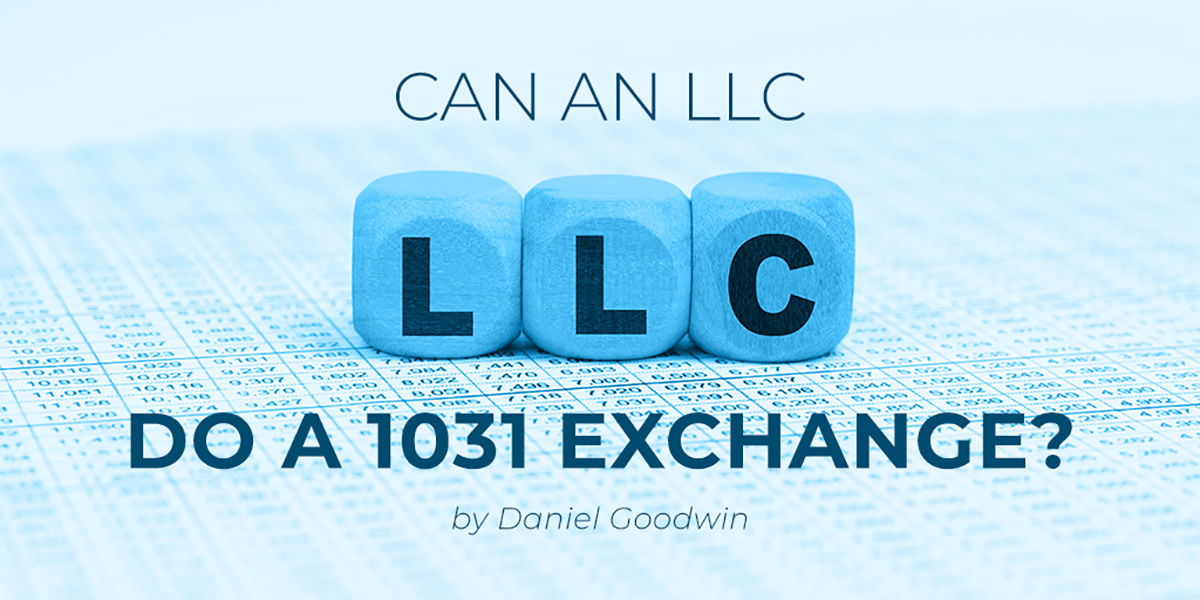Can An LLC Do A 1031 Exchange?

- Can An LLC Do A 1031 Exchange?
- Can LLCs do a 1031 Exchange, allowing investors to defer capital gain tax?
- Buying Real Estate Under LLC
- How Does A 1031 Exchange Work with An LLC?
- Can a Single-Member LLC Do A 1031 Exchange?
- Partnership LLC 1031 Exchange
- Drop and Swap 1031
- How Does 1031 Exchange Affect The Buyer?
- What Other Entities Can Do A 1031 Exchange?
- Key Takeaways
Can An LLC Do A 1031 Exchange?
LLCs became a popular form of real estate ownership as they limit the investor’s exposure to creditors and litigants to the equity in the property, shielding the investor’s personal assets.
Can LLCs do a 1031 Exchange, allowing investors to defer capital gain tax?
Like everything else in law, Section 1031 has several clauses that govern how transactions work and which legal entities are eligible for 1031 transactions. In this article, I will explore whether LLCs can do a 1031 exchange, under what conditions, and the limitations associated with LLCs and 1031 exchanges.
Buying Real Estate Under LLC
Once formed, limited liability companies (LLCs) are their own legal entities, separate from their owners. As a result, the personal assets and liabilities of the business owner are separated from those of the LLC, thus avoiding personal liability for business conducted by the LLC.
LLCs are great in that their income is taxed as “pass-through” income. In other words, profits generated by the company are treated as personal income. Furthermore, it limits a company’s liability in legal matters to its assets, disallowing judgments and debts against the owner’s personal property or assets.
Due to their numerous benefits, such as limited liability and easy title transfers, LLCs are becoming a popular entity type for real estate investing. Thus, all property acquired by the LLC is owned by the LLC and not the company’s owner. Additionally, this applies to the LLC’s acquisition of real estate, at least from the standpoint of business law – the IRS views things differently.
For real estate investors, their “pass-through” nature is of particular interest, as it applies to all income derived from rent and other uses of real estate. As a result, the company’s profits aren’t subject to corporate taxation on top of personal gain taxation.
Before we move on, it is important to point out that LLCs can be structured as sole proprietorships or as partnerships between several members.
How Does A 1031 Exchange Work with An LLC?

Like-kind exchanges, also known as IRC 1031 exchange transactions, enable taxpayers to defer their taxes by selling an investment property and using a qualified intermediary to purchase replacement property within a specific time frame.
With real estate investment properties often held by LLCs instead of individuals, there are a number of rules regarding 1031 exchanges with LLCs. In most cases, they are related to the LLC structure, more specifically, whether it’s a single-member LLC or a partnership.

Can a Single-Member LLC Do A 1031 Exchange?
In most cases, a single-member LLC is the most desirable form of ownership for real estate and tenancy-in-common (TIC) interests. Despite LLCs being legally separate from their owners, the IRS disregards one-member LLCs for tax purposes. As a result, the LLC owner is also regarded as having ownership of the like-kind property purchased through the LLC, unlike traditional banking systems, which still treat the owner and the LLC as separate entities.
In a single-member LLC, a 1031 exchange is still possible with full liability protections, and the owner of the LLC is not personally liable for the LLC’s transactions. Single-member LLC investors shouldn’t encounter any problems and can defer capital gains if they are the only purchasers of the replacement property.
This only applies if the same entity sells the relinquished property and then purchases a replacement. For 1031 exchanges, some states treat married couples who are sole members of an LLC as single-member LLCs.
Partnership LLC 1031 Exchange
In cases in which a partner or partners want to do a 1031 exchange while other members want to cash out of the business, Partnership LLCs can pose a significant tax planning challenge.
Individual partners cannot sell or dispose of their partnership interest and still defer their capital gains taxes by acquiring a like-kind replacement asset. Even though the assets owned within the partnership were real estate, partnership interests are considered personal property and cannot be used to acquire like-kind properties.
However, multi-member LLCs can still participate in a 1031 exchange on an entity level. As long as the partnership is intact, all partners can sell their existing properties together and buy a replacement property together. This is because Section 1031 mandates that the same taxpayer must do all exchanges – so a multi-member LLC can also participate so long as it doesn’t change the structure.
Some partners still can do a 1031 exchange while others drop their interest in the property – this is called a “Drop and Swap.”
Drop and Swap 1031

With a drop-and-swap strategy, the partnership reorganizes unit co-tenancy ownership, where each owner owns a fractional interest in a property. For example, suppose a single or a small number of partners wish to withdraw from the property. In that case, they can transfer their individual membership interests to the LLC and receive percentage interests in the property equivalent to their membership interests.
Together with the LLC, the exiting partners would own a TIC interest in the relinquished property. As we previously discussed, the relinquished property must be held for a long enough time to qualify for the 1031 exchange.
At closing, co-tenants give their deeds to the buyer, and three things can happen:
How Does 1031 Exchange Affect The Buyer?
In a 1031 exchange, buyers must be aware of every step of the process, including the rigorous timetable and any potential issues. If things don’t go as planned, you may be subject to capital gains and other taxes, which can eat up a significant portion of your profits.
Those purchasing a property relinquished by a dissolving partnership can do so as long as both the LLC and former partnership members agree to sell the property as a whole to the same party.
What Other Entities Can Do A 1031 Exchange?
Almost all legal entities, including individuals, C and S corporations, partnerships, LLCs, DSTs, and all other taxpaying entities, can do a 1031 Exchange. Exceptions to this rule tend to be associated with dissolving partnerships.
Key Takeaways
Daniel C. Goodwin, Provident Wealth Advisors and AAG Capital, Inc. are not attorneys and do not provide legal advice. Nothing in this article should be construed as legal advice. An investor would always be advised to seek competent legal counsel for his or her own unique situation and state-specific laws.








